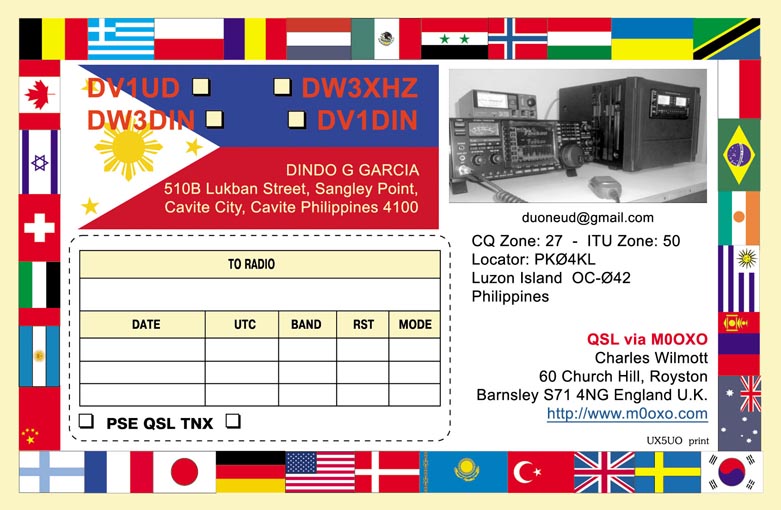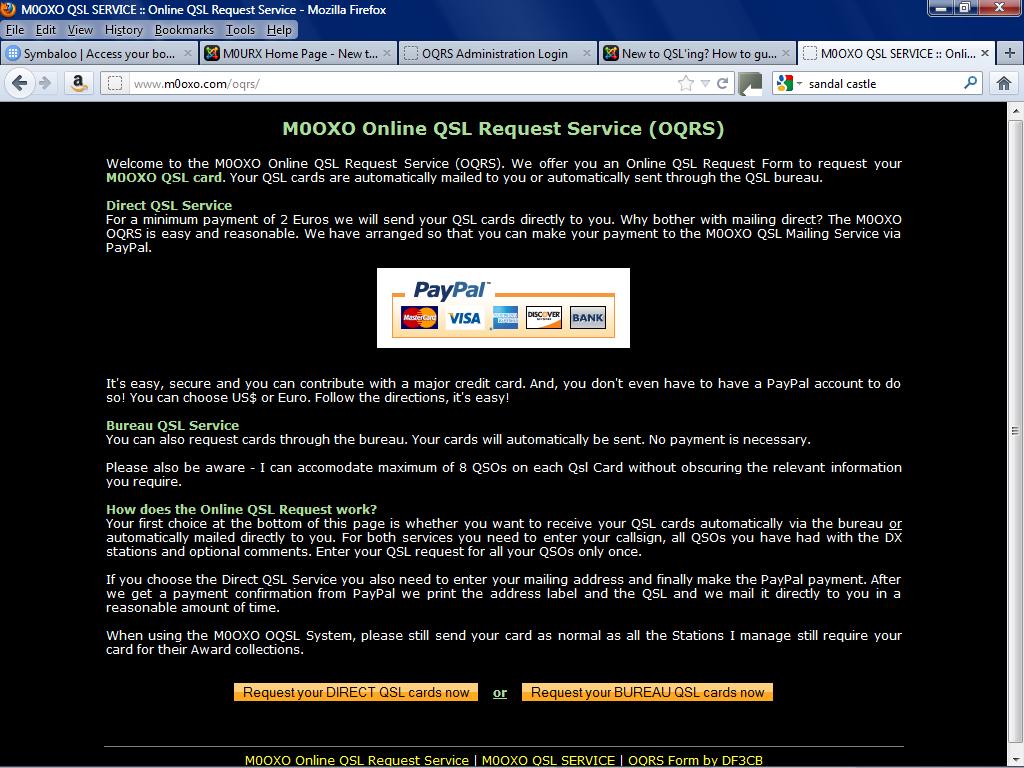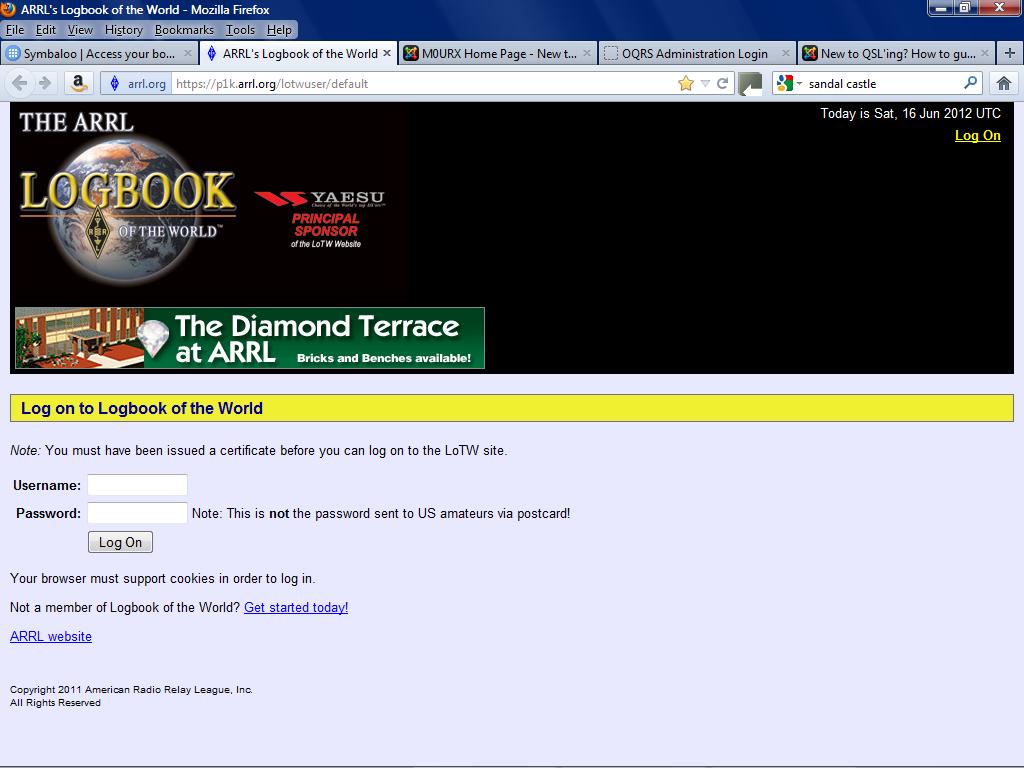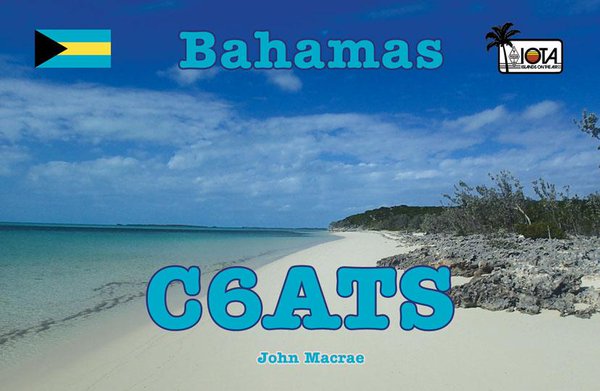Choosing a QSL Card
This is where many amateurs around the world fail. Most exotic DX stations have QSL managers, like myself, that will have special cards printed for them which usually include a photo and information about their location along with the needed information to confirm the contact. You can design your own and have a local printer  produce them for you or you can order cards from one of many services you will find advertised in Radcom, On-line services and other Ham Radio magazines.
produce them for you or you can order cards from one of many services you will find advertised in Radcom, On-line services and other Ham Radio magazines.
Check out my supplier of cards; Gennady UX5UO. cheap, easy, good quality and an easy payment option by Paypal, Cheque, Bank transfer etc to a UK representative (No sending money abroad)!
Give some thought to the content of the card and the quantity you will need. Usually larger quantities are much less expensive on a per card basis.
Contents of a QSL Card
There is some information that needs to be on all QSL cards to be valid for the various awards, and also to confirm the contact. This includes both call signs (yours and the station worked), the frequency or band, the mode, date and time, and a signal report. This is highlighted in point 3 below;
1) Callsign; Your Callsign needs to be on both sides of the card. It needs to be big enough to be easily seen by the person who you are sending it to. You may also consider (on the rear), adding several other of your Callsigns in which case you would to have the ‘tick-box’ option on there (see image below).
2) Your name with Postal and Email addresses (if applicable).
3) QSO information area. This should be large enough for you to write all the data needed to confirm the QSO. Date, Time (UTC), Band, Mode, RST etc etc are all required. You also have the option here of making this area dual-purpose.  It can be used for hand writing cards but if the area is made the same size as a label for example, then you will have the option to overlay this area with a QSO Label (see image left).
It can be used for hand writing cards but if the area is made the same size as a label for example, then you will have the option to overlay this area with a QSO Label (see image left).
4) Also, you may also add the details of your CQ and ITU zones, the county you are in, your grid location (primarily if you operate above 50 MHz) but most of these things MUST be added as they may required to enable a station to confirm his details for any applicable Awards he may be chasing such as DXCC. If you are on an Island then please check IOTA rules as they have specific requirments to enable your card to be valid for IOTA claims. For example IOTA group reference and Island name must be on the card to validate for IOTA.
Sending or requesting a QSL Card:
To send a QSL to an amateur you have contacted (QSO) you usually have several choices.
QSL direct via the Post Office (Post Mail), via your QSL Bureau or by the now popular OQRS (On-line Qsl Request System)*. Using the Bureau is by far the most cost effective route but you might not want to wait several Years for the QSL confirmation so QSL Direct to the station is then the required option.
* OQRS offers you an Online QSL Request Form to request your QSL card. Your QSL cards are automatically  mailed to you or automatically sent through the QSL bureau which cuts down the time for example the Bureau by half. Instead of waiting 2 yrs plus for the card, this service allows you to receive it within Days (Direct) or less than 12 months (Bureau). Have a look here at my OQRS system and you will have a clearer idea of what it entails.
mailed to you or automatically sent through the QSL bureau which cuts down the time for example the Bureau by half. Instead of waiting 2 yrs plus for the card, this service allows you to receive it within Days (Direct) or less than 12 months (Bureau). Have a look here at my OQRS system and you will have a clearer idea of what it entails.
For example, for a minimum payment of 2 Euros I will send your QSL cards directly to you. Why bother with mailing direct? The M0OXO OQRS is easy and reasonable. I have arranged so that you can make your payment to the M0OXO QSL Mailing Service via PayPal or free if using the OQRS Bureau option.
* DIRECT To QSL direct you will fill out your QSL card and mail it the the person you contacted. Say you had a QSO with MØOXO and you would like his QSL card. First you need to find his address. This can be done by searching an online callbook such as Buckmaster or QRZ.COM!.Then, fill out the the card, address it, add a Self-Addressed envelope, put a stamp on and drop it in the Postbox. Usually in a few days to a few weeks you can expect a card in return if within the UK.
IMPORTANT – If you are sending a card to a DX contact it is generally good practice to include a self addressed envelope and return postage. Do not use the postage of your country as it will not be valid for use in the DX country. Instead include either $2 US dollar bills (known by hams as a ‘green stamps’) or an International Reply Coupon (IRC) which you can usually purchase at the post office (Availability of IRC’s is changing, please contact me if you need up to date advice). **(Do not send coins)**
*BUREAU
Using a QSL bureau is by far the least expensive way to collect QSL cards. Using a QSL bureau is by far the least expensive way to collect QSL cards. Most countries where amateur radio is permitted are members of the IARU (International Amateur Radio Union) and will have a bureau, where cards are collected from hams within the country and then forwarded in bulk to the destination country. Using bulk mail to send your cards to the bureau and for them to forward the cards to other countries cost much less for postage than mailing individual cards. The RSGB Bureau in the UK (Norcomm) offer the services for both outgoing and incoming QSL cards. Check the RSGB Website for the requirements and eligibility of using their service.
On-Line Qsling (LOTW & EQSL)
More recently the ability to send/receive QSL confirmations has now become available via the Internet. To do this you only need to go to eQSL.cc at http://www.eqsl.cc/qslcard/ and register for this free service.  Using your web browser you will be able to design your own QSL card, send cards to contacts you have made and receive cards. The service also provides features for organizing cards received and creating summaries of them. Currently eQSLs are acceptable for CQ Awards.
Using your web browser you will be able to design your own QSL card, send cards to contacts you have made and receive cards. The service also provides features for organizing cards received and creating summaries of them. Currently eQSLs are acceptable for CQ Awards.
LOTW (Logbook Of The World) is also very popular. This system IS valid for DXCC & WAS Award claims so it is widely used. It is understood that at sometime in the future IOTA MAY also be available by this system. If you need advice on LOTW then please email me.
QSL Managers
Active DX stations often use a QSL manager especially when mail to the DX country is difficult at best and non-existent at worst. You will be aware of the QSL manager when looking up the address of the DX call on Qrz.com or by lists published in some of the amateur literature. You must know whether the station of who’s QSL card you need uses a manager. it is imperitive that this information is added to your outgoing card.
Check out my QSL Manager page at https://www.m0oxo.com/qsl-manager.html for an overview or more information on the topic.
I hope this page was of interest to you and maybe it answered at least some of your enquires. If you have any comments both good or bad, please feel free to ask by using the information on this link (contact M0OXO).

